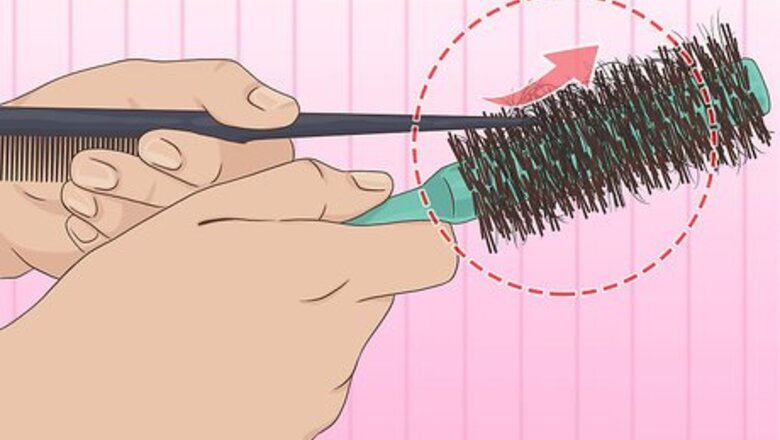
views
Removing the Hair
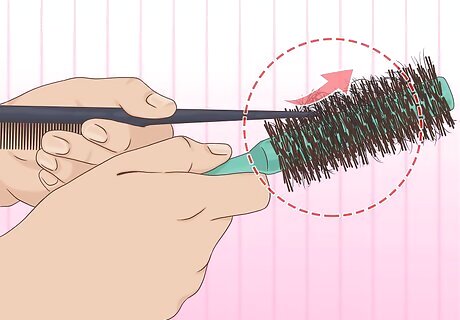
Lift the hair away from the brush with a rat tail comb. Over time, hair tends to get wrapped around the barrel of the brush. Slide the point of a rat tail comb between the barrel and the matted hair. Try to push the comb under all of the hair that covers the length of the barrel and then gently lift the comb upward to loosen the hair. If you don’t have a rat tail comb, use a pen instead.
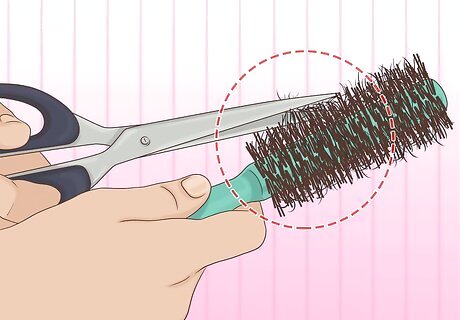
Cut the lifted hair with a pair of scissors. This breaks up the matted hair and makes it easier to pull away from the hairbrush. Use scissors to cut the hair in a straight line from the bottom of the barrel to the top. If the bristles on your brush are close together, use a narrow pair of scissors, such as nail scissors. Take care not to cut any of the bristles.
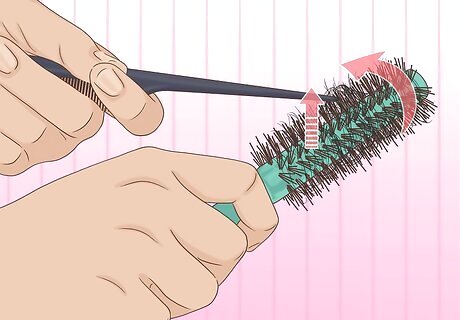
Rotate the brush 180° and repeat the lifting and cutting process. This makes it easier to pull the hair off the brush and reduces the strain on the bristles, especially if they have little rubber balls on the end. Turn the brush over, pull the hair away from the brush again with a rat tail comb, and then cut it with scissors. If you don’t have much hair on your brush, you can skip this step.
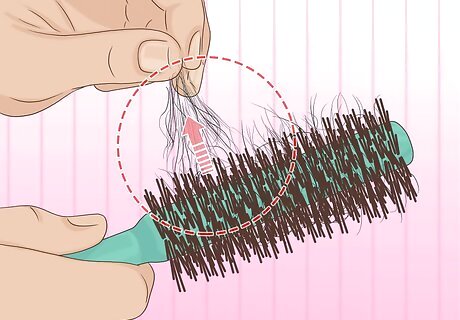
Pull the hair off the brush. Gently tug the strands of hair away from the bristle. Try not to pull on the bristles, as this can misshape them and damage their ends. Keep pulling the strands until the brush is completely clean. Throw the old hair into the trash, as it can block your pipes if it goes down the sink.
Cleaning Your Brush with Baking Soda
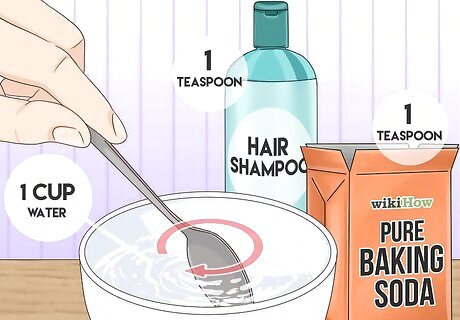
Mix water, shampoo, and baking soda in a small bowl. Measure 1 cup (240 mL) of water, 1 teaspoon (4.9 mL) of shampoo, and 1 tsp of baking soda (6 grams) in a small bowl. Stir the mixture until the water, shampoo, and baking soda are fully combined. Alternatively, you can soak it in warm water with 2 to 3 pumps of shampoo. Use a scented shampoo to give your hairbrush a fresh smell. This method can be used on metal and plastic hairbrushes
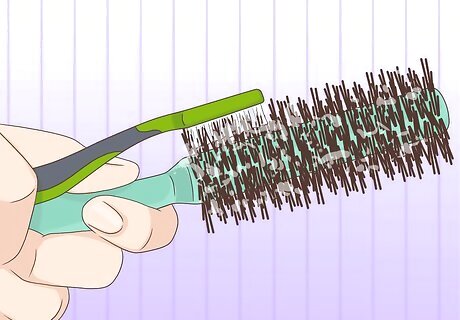
Brush the solution onto the brush’s bristles and base with a toothbrush. Dip the toothbrush into the baking soda solution and then brush it over the brush. Clean between the bristles, the handle, and the bristles to completely sanitize your brush. Use a clean toothbrush for this task and then throw it away after.
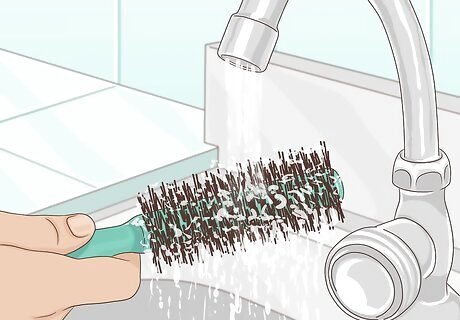
Rinse the brush in cold water. Briefly place the brush under a cold tap or quickly dip it into a bowl of water. This rinses off the baking soda solution. Shake the brush to remove the excess water. Avoid soaking your brush in water as this can cause mildew to grow.
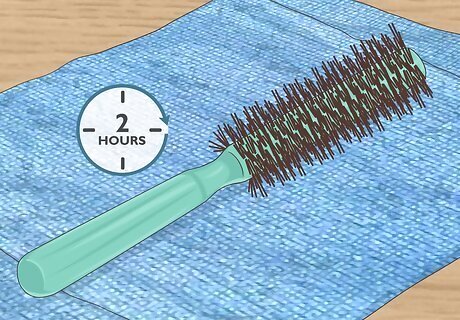
Place the brush on a clean towel to dry. Leave your brush to dry for 2 hours. If it is still wet, leave it to dry for another 2 hours. Avoid leaving your brushes to dry outside, as this can cause them to get dusty.
Using Tea Tree Oil to Clean a Wooden Brush
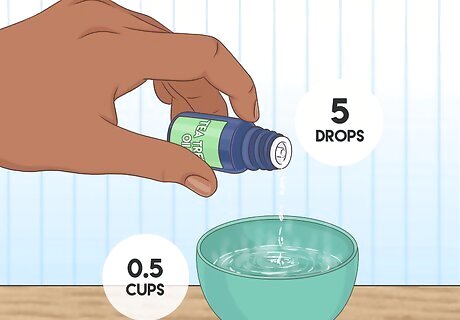
Mix hot water and tea tree oil in a bowl. Measure 0.5 cups (120 mL) of hot tap water and 5 drops of tea tree essential oil into a small bowl. This method works well for wooden brushes as it uses limited water. Purchase tea tree oil from a pharmacy, supermarket, or a natural health store.
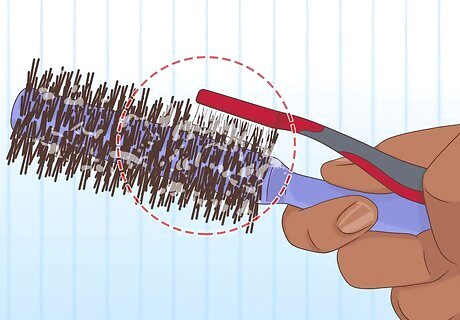
Brush the solution over the bristles with a toothbrush. Dip a clean toothbrush into the water and tea tree solution, and gently brush it over the bristles and base of the brush. If you notice any drips of water running down the base of the barrel, shake them off, as sitting water can damage the wooden surface of the brush. Turn the brush around to clean the bristles on the other side of the brush.
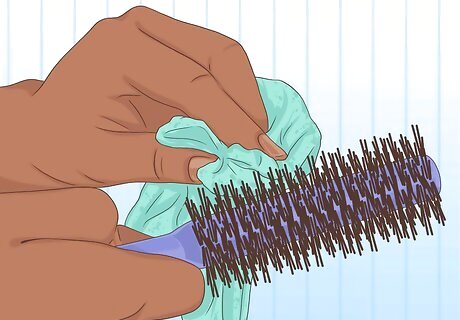
Wipe the brush thoroughly with a cloth. Use a soft cloth to dry all the water from the barrel and the bristles. Rotate the brush to dry the other side. Continue to dry the brush until all traces of water are gone. Microfibre cloths work well for this purpose.
















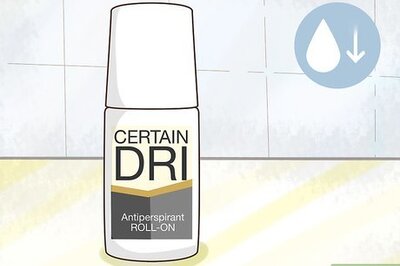

Comments
0 comment